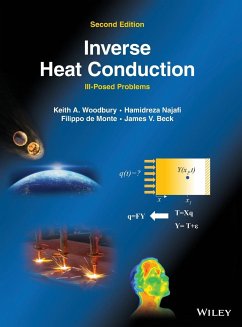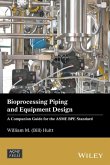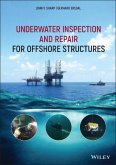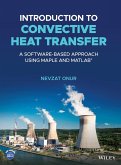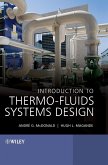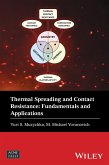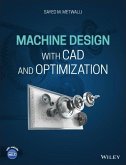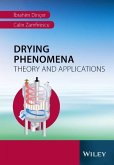Inverse Heat Conduction
A comprehensive reference on the field of inverse heat conduction problems (IHCPs), now including advanced topics, numerous practical examples, and downloadable MATLAB codes.
The First Edition of the classic book Inverse Heat Conduction: III-Posed Problems, published in 1985, has been used as one of the primary references for researchers and professionals working on IHCPs due to its comprehensive scope and dedication to the topic. The Second Edition of the book is a largely revised version of the First Edition with several all-new chapters and significant enhancement of the previous material. Over the past 30 years, the authors of this Second Edition have collaborated on research projects that form the basis for this book, which can serve as an effective textbook for graduate students and as a reliable reference book for professionals. Examples and problems throughout the text reinforce concepts presented.
The Second Edition continues emphasis from the First Edition on linear heat conduction problems with revised presentation of Stolz, Function Specification, and Tikhonov Regularization methods, and expands coverage to include Conjugate Gradient Methods and the Singular Value Decomposition method. The Filter Matrix concept is explained and embraced throughout the presentation and allows any of these solution techniques to be represented in a simple explicit linear form. Two direct approaches suitable for non-linear problems, the Adjoint Method and Kalman Filtering, are presented, as well as an adaptation of the Filter Matrix approach applicable to non-linear heat conduction problems.
In the Second Edition of Inverse Heat Conduction: III-Posed Problems, readers will find:
_ A comprehensive literature review of IHCP applications in various fields of engineering
_ Exact solutions to several fundamental problems for direct heat conduction problems, the concept of the computational analytical solution, and approximate solution methods for discrete time steps using superposition of exact solutions which form the basis for the IHCP solutions in the text
_ IHCP solution methods and comparison of many of these approaches through a common suite of test problems
_ Filter matrix form of IHCP solution methods and discussion of using filter-form Tikhonov regularization for solving complex IHCPs in multi-layer domain with temperature-dependent material properties
_ Methods and criteria for selection of the optimal degree of regularization in solution of IHCPs
_ Application of the filter concept for solving two-dimensional transient IHCP problems with multiple unknown heat fluxes
_ Estimating the heat transfer coefficient, h, for lumped capacitance body and bodies with temperature gradients
_ Bias in temperature measurements in the IHCP and correcting for temperature measurement bias
Inverse Heat Conduction is a must-have resource on the topic for mechanical, aerospace, chemical, biomedical, or metallurgical engineers who are active in the design and analysis of thermal systems within the fields of manufacturing, aerospace, medical, defense, and instrumentation, as well as researchers in the areas of thermal science and computational heat transfer.
Hinweis: Dieser Artikel kann nur an eine deutsche Lieferadresse ausgeliefert werden.
A comprehensive reference on the field of inverse heat conduction problems (IHCPs), now including advanced topics, numerous practical examples, and downloadable MATLAB codes.
The First Edition of the classic book Inverse Heat Conduction: III-Posed Problems, published in 1985, has been used as one of the primary references for researchers and professionals working on IHCPs due to its comprehensive scope and dedication to the topic. The Second Edition of the book is a largely revised version of the First Edition with several all-new chapters and significant enhancement of the previous material. Over the past 30 years, the authors of this Second Edition have collaborated on research projects that form the basis for this book, which can serve as an effective textbook for graduate students and as a reliable reference book for professionals. Examples and problems throughout the text reinforce concepts presented.
The Second Edition continues emphasis from the First Edition on linear heat conduction problems with revised presentation of Stolz, Function Specification, and Tikhonov Regularization methods, and expands coverage to include Conjugate Gradient Methods and the Singular Value Decomposition method. The Filter Matrix concept is explained and embraced throughout the presentation and allows any of these solution techniques to be represented in a simple explicit linear form. Two direct approaches suitable for non-linear problems, the Adjoint Method and Kalman Filtering, are presented, as well as an adaptation of the Filter Matrix approach applicable to non-linear heat conduction problems.
In the Second Edition of Inverse Heat Conduction: III-Posed Problems, readers will find:
_ A comprehensive literature review of IHCP applications in various fields of engineering
_ Exact solutions to several fundamental problems for direct heat conduction problems, the concept of the computational analytical solution, and approximate solution methods for discrete time steps using superposition of exact solutions which form the basis for the IHCP solutions in the text
_ IHCP solution methods and comparison of many of these approaches through a common suite of test problems
_ Filter matrix form of IHCP solution methods and discussion of using filter-form Tikhonov regularization for solving complex IHCPs in multi-layer domain with temperature-dependent material properties
_ Methods and criteria for selection of the optimal degree of regularization in solution of IHCPs
_ Application of the filter concept for solving two-dimensional transient IHCP problems with multiple unknown heat fluxes
_ Estimating the heat transfer coefficient, h, for lumped capacitance body and bodies with temperature gradients
_ Bias in temperature measurements in the IHCP and correcting for temperature measurement bias
Inverse Heat Conduction is a must-have resource on the topic for mechanical, aerospace, chemical, biomedical, or metallurgical engineers who are active in the design and analysis of thermal systems within the fields of manufacturing, aerospace, medical, defense, and instrumentation, as well as researchers in the areas of thermal science and computational heat transfer.
Hinweis: Dieser Artikel kann nur an eine deutsche Lieferadresse ausgeliefert werden.

